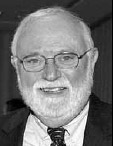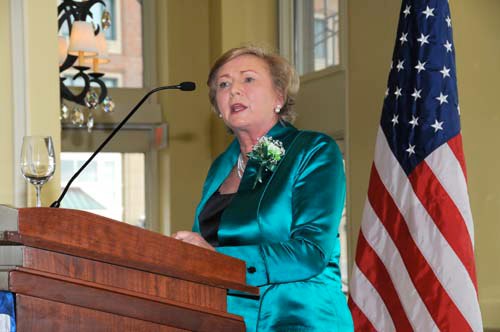
April 3, 2012
Boston’s St. Patrick’s events were the occasion of the visit to Boston of Frances Fitzgerald, T.D., the Ireland government minister who is designing new initiatives to protect the country’s children.
Fitzgerald, T.D., who serves in the Dail representing city residents in the Dublin Mid West constituency, undertook a whirlwind set of public appearances that included the launch of an initiative with the Irish Pastoral Centre, a St. Patrick’s breakfast speech hosted by the Irish American Partnership, a star turn as the honored guest at the Irish Network/Boston St. Patrick party at the Moakley Court House, and a visit to Holyoke for that city’s St. Patrick’s parade.
 Fitzgerald speaks in Boston
Fitzgerald speaks in Boston
Trained as a social worker, with degrees from University College/ Dublin and the London School of Economics, Fitzgerald was born in Cork and moved with her parents to Dublin at age 13. She spent 20 years working as a social worker and family therapist in Dublin and London. Before her election to the Dail, she chaired the National Women’s Council of Ireland (1988-1992) and was vice president of the European Women’s Lobby.
A member of Taoiseach Enda Kenny’s Fine Gael party, she came to Boston just weeks after Kenny’s February visit, and she echoed his upbeat, optimistic rhetoric coming just one full year after the Fine Gaels took control of the government in a power-sharing coalition with the Labour party.
“We hit the ground running,” she said in a March 16 interview. “We have taken everything that has come our way and in a very
constructive, positive sort of way, and we wanted to rebuild our international reputation. We felt that it had been damaged. We feel one year around that we're well on the way, not least of which is typified by our visits to America this week, and the kind of
investment that we are getting from American companies.
“Our message is that we are open for business, our international reputation has been won back, and that we have a very constructive approach towards business. We are reforming government, reforming the way things have been done. We are becoming more competitive again, we had lost our competitiveness. We are resilient and we are turning things around.”
Minister Fitzgerald said she had been chosen to establish a new focus on children and families, an expertise that has been part of her professional live for decades. “I am very honored to be appointed the first Minister for Children and Youth Affairs,” she said. “It's a new post which the Taoiseach decided to create at cabinet level in order to integrate the services for children which were spread across a lot of departments – education, justice, health -- to bring together integrated services for children.
”We have had a slightly tortured history in relation to children and institutions and abuse. I see this as a turning point to
child protection in Ireland. We are going to have a referendum, we're going to put to the people that now, in the constitution, children have rights; their voice should be heard and that their best interest should be considered.
”It's very exciting. The first job is obviously child protection, second is economic opportunity for our children, and health and
educational opportunities, and to insure what the Taoiseach says about children: to make Ireland the best place in the world to raise a family, the best place to create business, and the best place to grow old. That's the challenge; it's tough times at the moment.”
Speaking about the pedophile crisis that has shaken the Catholic Church in Ireland, Fitzgerald said, “We're in a new place, I think it's a kind of mutual respect. The inappropriate deference isn't there, and I say that on the record. but there’s respect for the job the church has to do, respect for the job the state has to do, and that's what [Kenny’s] Cloynes speech was about. It was a marker, and it was saying in relation to the practices which had been so exposed in the Cloynes report, that they simply weren't good enough.
”But I think what's important to recognize now is that in Ireland the church has brought in a whole lot of its own new procedures that are very strong. The church is learning and there is change and it’s absolutely welcome. It's about facing up to it and having the right procedures.
”And by the way: the state has failed as well, so there are state failings and church failings, and it's about addressing both. And that's what was in the Taoiseach's speech: ‘Enough is enough.’ ”

